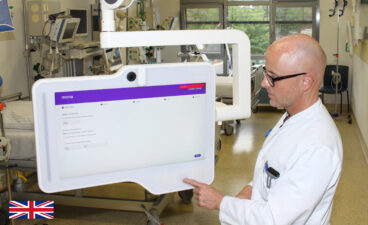Using Clinical Data and AI to reshape COPD – fractional dynamics deep learning models

Chronic Obstructive Pulmonary Disease (COPD) is a progressive inflammatory lung disease that causes obstructed airflow and breathing difficulties. COPD is a major global health burden, yet diagnosis can be challenging. Spirometry is the standard diagnostic test but has limitations in accessibility and accuracy. There is a need for an accurate, non-invasive approach to detect COPD early and monitor progression.
In this new project, together with a world-class consortium, Clinomic AI Lab seeks to develop a novel AI algorithm that can stage COPD from exhaled breath signatures. Prior research has shown volatile organic compounds (VOCs) in breath can serve as biomarkers for COPD severity. In this regard, we are developing a deep learning based AI model to analyse VOC patterns from repeated breath measurements on a proprietary breath analysis device. The AI algorithm aims to identify COPD-specific VOC trajectories to classify patients into disease stages.
This AI breath test could provide an easy, low-cost way to screen for COPD in point-of-care settings globally. We will validate the algorithm through robustly designed clinical trials across COPD populations. By detecting COPD early and tracking progression via breath signatures, our solution aims to transform COPD management and outcomes through timely interventions.
We have already successfully reproduced key results from the paper “Fractional dynamics foster deep learning of COPD stage prediction” by Chenzhong Yin et al. Through multifractal analysis and deep learning, they were able to accurately classify COPD stages from physiological signals. We replicated their fractal signal processing and neural network approach on sample COPD datasets. The Fractional Dynamics Deep Learning Model (FDDLM) was developed using the WestRo COPD dataset, comprising 4432 medical records with 12 physiological signals per record, gathered longitudinally from 54 COPD patients across 4 clinics in Western Romania using a NOX T3 portable sleep monitor. Our recreation achieved the same performance, validating the utility of fractal-based AI for COPD staging.
Fig 1: K- Fold cross Validation results
In reproducing the paper’s results, the implemented fractional dynamics deep learning model (FDDLM) achieved high accuracy in predicting COPD stage, with the training and testing accuracy reaching over 98%. As shown in Fig1, the confusion matrix on the test set showed excellent classification, especially for early COPD stages. The training and testing loss decreased steadily during training without overfitting. In conclusion, the reproduction validated the high prediction accuracy and model efficiency of the proposed approach for COPD diagnosis based on fractional dynamics modelling and deep learning. This provides a strong foundation for our breath analysis algorithm by demonstrating that fractal signatures can capture COPD progression.
In summary, this project will develop AI algorithms to longitudinally analyse VOC patterns in breath samples. By applying advanced analytics to repeated measurements, we aim to derive insights into VOC trajectories indicative of COPD progression. Our goal is a non-invasive breath test that enhances the value proposition of our partner’s proprietary portable breath analysis device through accurate and early COPD staging for improved clinical management.
Mehr Beiträge

Connecting Digital Health: Clinomic at the DMEA 2024

Using Clinical Data and AI to reshape COPD – fractional dynamics deep learning models
